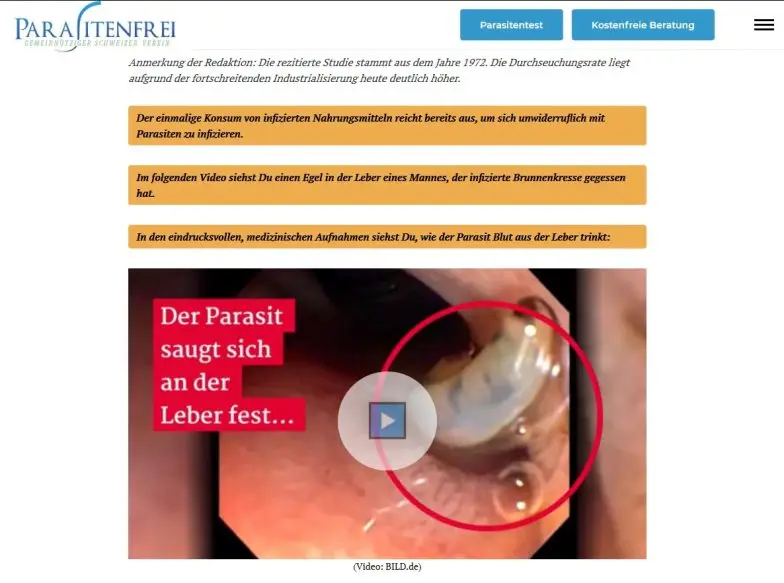Parasites: a widespread disease on the rise
It is commonly assumed that only people in developing countries suffer from parasitic infestation. Until two decades ago, that was certainly true. In the meantime, however, a veritable infestation with parasites has been recorded in western latitudes. In the meantime, there are increasing numbers of publications in which doctors and researchers explain the serious health risks posed by parasites in the human body. Well-known scientists such as Dr. Leonard Goodwin, Dr. Dietrich Klinghardt, Dr. Raj Banerjee, Dr. Jaroslav Flegr, Dr. Raphael D’Angelo and many more [1]. The non-profit Swiss association Parasitenfrei explains the most important facts and provides comprehensive information in this article.

The worm researcher Dr. Leonard Goodwin warned of the global threat posed by parasites as early as 1948
What are parasites?
Definition: “Parasite (parasite); Living beings that derive unilateral benefit from living together with another living being (host), feed on the host, attack it for reproductive purposes, damage the host and cause diseases by impairing organ functions, destroying cells and depriving it of nutrients [2].
By definition, it is clear that parasites only have a harmful effect on the human body and are in no way beneficial to health. In addition to the well-known intestinal worms, there are numerous other pathogens such as leeches, protozoa and other infectious organic structures [3].

Intestinal worms – just one of many forms of parasites
Parasitic life forms have been living on this planet for 500,000,000 years and therefore – since the beginning of its existence – also in humans. Since the immune system always reduced the parasitic infestation to a non-pathogenic level, it was not a problem for a long time [4]. However, our body’s defenses succeed less and less.
How and where do parasites work in the body?
All organs of the human body can harbor these parasites [5]. Cases of the large and small intestines are well known. Parasites can also be found in the lungs, liver, brain, heart and even in the blood [6].

In the affected organ, the parasites feed on the host’s nutrients [7], release toxins through their metabolic products [8] and influence the local immune system in such a way that it is largely defenseless against the parasites [9].
How do I know if I have parasites?
In the course of evolution, parasitic life forms have specialized in such a way as to remain undetected as far as possible [10]. This poses a challenge in diagnostics. For example, parasites in the blood can be detected by means of dark field analysis. However, parasitic occurrences in other organs cannot be determined using this technique [11]. Stool examinations are also unsuitable as evidence, since parasites do not leave the host’s body voluntarily.

All humans harbor parasites within themselves [12]. In this respect, we shouldn’t ask ourselves whether we have parasites, but rather whether they make us sick?
According to leading experts, 80-95% of the symptoms or diseases that occur in the population in western latitudes are due to parasites [13].
Parasitic complaints can be:
- Exhaustion, lack of energy, chronic fatigue (despite getting enough sleep)
- Cravings, e.g. for sugary food (especially in the evening)
- bloated stomach and flatulence (especially in the evening)
- Sleep disorders (e.g. difficulty falling asleep or waking up at night)
- Skin problems or skin diseases
- Regular headaches
- Depressive moods
- Mood swings
- Mood swings
- Idiopathic itching
- Muscle, joint or back pain
- u.v.m. [14]

The non-profit Swiss association Parasitenfrei has developed a free test that can be used to obtain an online assessment of whether there is a parasite infestation.
Why do we suddenly get sick with our parasites?
Parasites don’t make us sick on purpose. However, if it spreads unchecked in the body, that is inevitably the result. The pathogenicity arises from their manipulative survival strategies and their toxic metabolic end products [15].
Nevertheless, the following question arises: How is it possible that parasites, which have lived in the human body for some time, have only recently made western civilization seriously ill?
Casus crisps for this are an increased infection rate [16], the increased intake of growth factors [17] and disastrous effects on the immune system [18].
An increased infection rate is due to the devastating conditions in factory farming [19] and fish farming [20], as well as the permanently falling water quality. This results among other things from the use of parasitically contaminated manure from factory farming [21], which seeps into the groundwater, but also through microbially contaminated supply pipes [22].

Growth factors for parasites include electrosmog and radiation, e.g. through the cell phone network, WiFi, 4G / 5G and the extended use of electricity, e.g. in vehicles [23]. Additional aspects that allow parasites to multiply and grow rapidly are highly processed foods [24], Heavy metals and other toxins [25]. Our immune defense is now significantly weakened by constant stress, the consumption of pesticides, a low vitamin D level and a malformed intestinal symbiosis [26].

The parasitic load becomes even more serious with 5G
A disturbed microbiome harbors another problem: “Positive” intestinal bacteria have, among other things, the task of limiting parasites on site. By taking antibiotics (up to 50% reduction on first use [27]), and absorption of its residues through meat from factory farming and fish from aquaculture, most people only have a fraction of the original number of their “good” intestinal bacteria. Parasites can often spread unhindered in the intestine and infect other organs from there [28]. Dr. John Switzer berichtet, that over 90% of civilization in western latitudes has too little stomach acid [29]. However, this represents a natural protection against parasites [30].
The non-profit Swiss association Parasitenfrei provides further information on the inevitable topic “Parasites in humans” free of charge https://www.volkskrankheit-parasiten.org/en/

